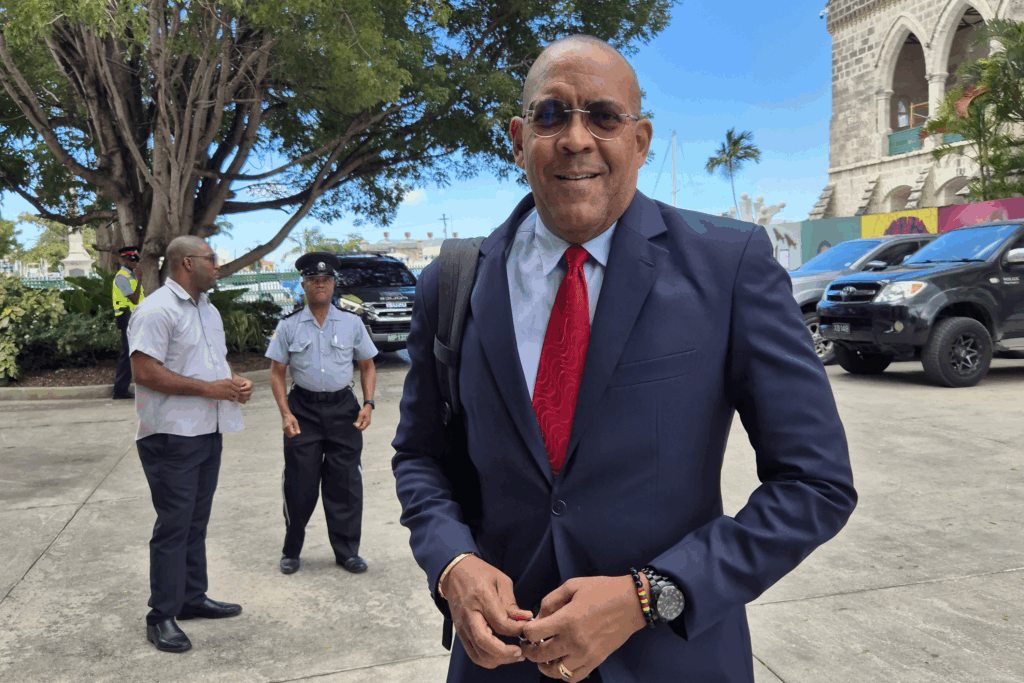Barbados is set to receive a significant economic boost as the OPEC Fund for International Development prepares to invest US$50 million ($100 million) through a policy-based loan to support the island’s national development priorities, Barbados TODAY has learnt exclusively.
Minister in the Ministry of Finance Ryan Straughn disclosed that the backing will take the form of a policy-based loan from the OFID, the 49-year-old development finance institution of the Organisation of the Petroleum Exporting Countries (OPEC), the world’s 12-nation petroleum-producing cartel.
“As part of government’s effort to expand sources of concessional financing, we have a relationship with the OPEC Fund for International Development, and as part of our advocacy for multilateral banks supporting small states, OPEC is set to provide a policy-based loan (PBL) to Barbados in the amount of US$50 million,” Straughn told Barbados TODAY on the sidelines of the Caribbean Debt Forum at the Hilton Barbados Resort.
“But the foundation, in terms of the prior actions within the policy matrix, is the previous PBL we had with the [Inter-American Development Bank]. That is important, given Barbados’ strong policy interventions over recent years. We have consistently advocated that multilateral development banks need to work more closely together.
“So, the OFID, OPEC support in this way means that we do not have to implement new reforms. They are supporting the existing reform efforts already undertaken by government. We will soon bring a resolution to Parliament to formalise this.”
He continued: “It really is a true example of multilateral banks collaborating, recognising that we are committed under a separate arrangement with the IDB. They are adopting that policy matrix without us having to create new policies to access the resources.”
The finance minister explained that although OPEC is an oil and energy-related entity, the loan is not specifically directed at the energy industry.
He said it is up to the government to determine how the funding will be invested, referencing previous borrowings from the Saudi Fund for Development to finance urban regeneration and the polyclinics.
“Just because it is OPEC does not mean it is only for energy,” Straughn said. “Other funds in the Middle East also want to undertake developmental work outside of energy. We do not intend to pigeonhole the policy interventions. Certainly, we will ensure that on renewable energy finance and Barbados’ transition to a green economy, we have access to concessional financing.”
The OPEC Fund loan deal is expected to be finalised by early December, with a blended interest rate of 4.1 per cent over 20 years and a five-year grace period. Typical interest rates would have fallen between 5.5 and six per cent.
“But with this blended approach, we have managed to negotiate down to 4.1 per cent. We are striving to ensure the cost of financing reflects our improved credit quality; as the nation’s credit ratings continue to rise, we anticipate that interest rates will fall correspondingly. We will continue to work towards this objective.”
Asked whether the government remained on track in repaying its various loans, the finance minister responded: “Absolutely.”
Straughn elaborated: “The anchor of these two BERT programmes has been ensuring we meet the primary surplus target; meeting these means that we set aside the monies to cover debt and improve services for Barbadians. Fiscal discipline is essential to meet obligations, pay down debt, and obtain cheaper financing,” he said.
The government has achieved this through liability management operations, which allow it to “squeeze out a few more extra dollars to focus on what Barbadians really want,” said Straughn.
“It really is about balancing how quickly we can achieve economic growth while managing liabilities by refinancing more expensive debt. When we completed the debt restructuring, financing costs were different compared to the current situation, given our improved credit ratings.”
Straughn emphasised that government is using the “strong” economic performance to refinance legacy debt, reflecting a better credit quality today.
“We are proactively trying to ensure we save every dollar possible, still making payments, but working to lower interest on debt over time, which means we can do more. There are more funds available daily and monthly to ensure Barbadians benefit, rather than simply servicing debt.”
OFID deal – What to know
About OFID
– The OPEC Fund for International Development (OPEC Fund, formerly OFID) is an intergovernmental development finance institution founded in 1976 by OPEC member nations.
– Headquartered in Vienna, Austria, the OPEC Fund’s core mandate is to promote economic and social progress among developing countries outside of OPEC through concessional loans, grants, and technical assistance.
– Since inception, it has committed over US$30 billion to development projects across more than 125 countries, focusing on sectors including food, water, education, health, energy, and infrastructure.
– The Organisation of the Petroleum Exporting Countries (OPEC) is not a member of the OPEC Fund. The two organisations do not have the same membership and are separate entities with their own unique mandates and tasks.
Barbados loan
– Barbados is set to receive a policy-based loan from the OPEC Fund, valued at US$50 million, with total committed backing of around $100 million.
– The loan is not restricted to energy; funds may be invested in a range of development priorities, including infrastructure and social services.
– Terms of the deal: blended interest rate of 4.1 per cent over 20 years, with a five-year grace period; well below traditional rates of 5.5–6 per cent.
– The OPEC Fund is supporting existing government reforms in Barbados, adopting the same policy matrix as a previous Inter-American Development Bank loan.
– Deal expected to be finalised by early December.
emmanueljoseph@barbadostoday.bb
The post Oil exporters to fund national priorities – Straughn appeared first on Barbados Today.


